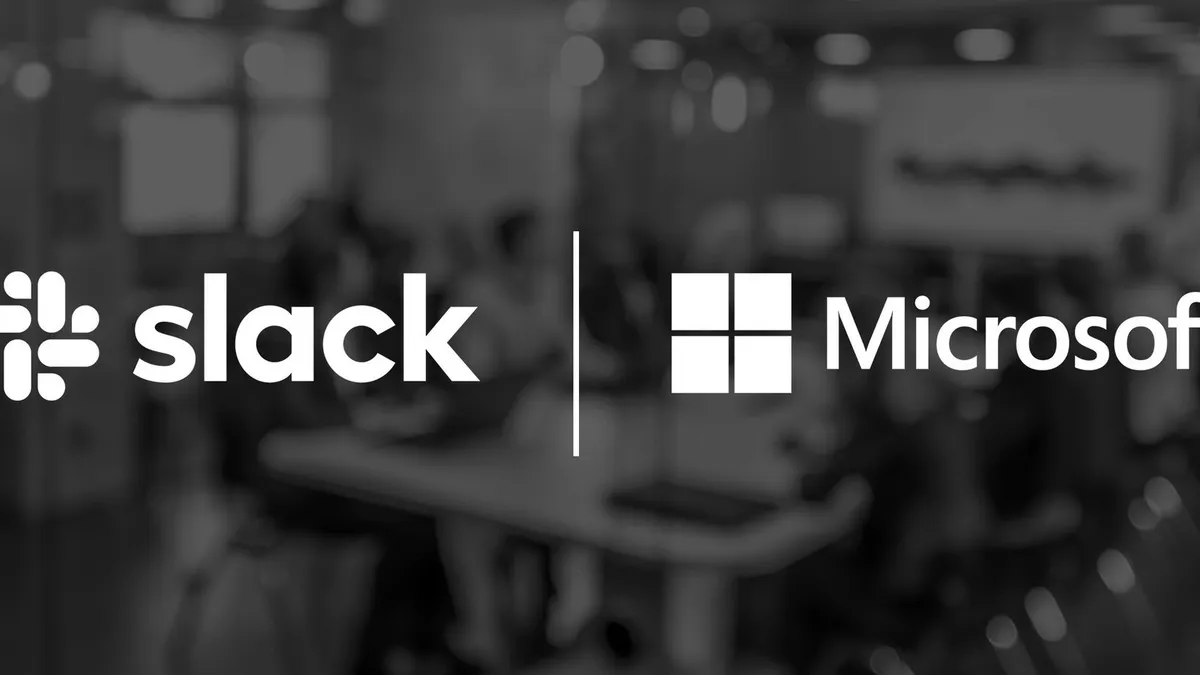Dive Brief:
- Slack filed an antitrust complaint against Microsoft with the European Commission Wednesday alleging the company has an "illegal and anti-competitive practice of abusing its market dominance" with Teams, according to the announcement. Slack is waiting for the European Commission to review the case. However, the European Commission is not obligated to "open formal infringement procedures — even if it considers a breach has occurred," according to the complaint process.
- Because Teams is bundled with its Office productivity suite, Slack alleges Microsoft has "force[d] installing it for millions, blocking its removal, and hiding the true cost to enterprise customers," according to the complaint.
- Slack is asking European Union authorities for a "level playing field" and to "referee" Microsoft's return to "past behavior," according to David Schellhase, general counsel at Slack, in the announcement. Schellhase was referring to Microsoft's actions during the "browser wars" in the 1990s.
Dive Insight:
Microsoft's latest iteration of enterprise chat, Teams, has been on Slack's tail since its 2017 debut.
"Slack is resorting to schoolyard bullying tactics, determined to force a podium appearance in a popularity contest that's no longer within reach," especially when the pandemic highlighted video meetings' dominance over chat, Carrie Basham Marshall, principal and CEO of Talk Social to Me, told CIO Dive.
In 2007, Microsoft acquired Parlano, which was at the time "a leading application for enterprise group chat," according to the announcement. The company rolled Parlano's MindAlign into its Office Communications Server and Office Communicator, the software that provided services such as instant messaging and conferencing.
Eventually in 2010, Microsoft released Lync, its "next generation" in unified communications software built on Parlano's MindAlign code. Lync was a rebrand of the Office Communications Server and Office Communicator products. In 2014, Lync became Skype for Business, which it intends to retire in 2021 making way for Teams.
Bundling is Microsoft's calling card. The company is an enterprise staple because it makes its solutions a one-stop-shop for customers.
But the company does have a history of antitrust complaints. Bill Gates sat on Capitol Hill more than 20 years ago after an internal memo outlined his desire to take down its competitor, Netscape. Gates' solution was bundling Internet Explorer with Windows. The company was accused of anti-competitive behavior.
Slack maintains its platform is a threat to Microsoft. Taking on Microsoft's dominance in "business email, the cornerstone of Office," could hurt Microsoft's presence in the enterprise, said Jonathan Prince, VP of Communications and Policy at Slack, in the announcement.
The timing of Slack's complaint — as Microsoft drops its latest earnings — is "no coincidence," said Basham Marshall. "Slack's attack is designed to be a gut-punch because it has realized that winning on the basis of voluntary adoption isn't in the cards." It fundamentally lacks the face-to-face virtual meeting capacity of Teams, Zoom and other video platforms.
Teams was created to combine collaborative solutions "with the ability to connect via video, because that's what people want," a Microsoft spokesperson told CIO Dive. The pandemic shifted the market in Teams' favor, "while Slack suffered from its absence of video-conferencing."
As the European Commission reviews Slack's complaint, Microsoft will answer "any questions they may have," according to the spokesperson.












